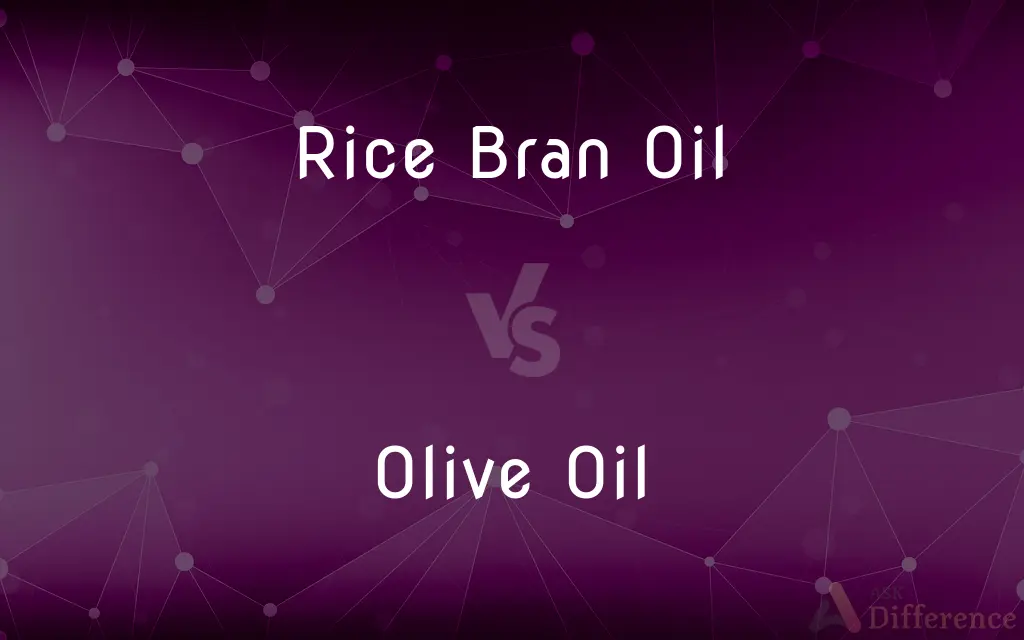Rice Bran Oil vs. Olive Oil — What's the Difference?
Edited by Tayyaba Rehman — By Fiza Rafique — Published on November 18, 2023
Rice Bran Oil is oil extracted from rice husk, while Olive Oil is derived from olives. Both are used in cooking.

Difference Between Rice Bran Oil and Olive Oil
Table of Contents
ADVERTISEMENT
Key Differences
Rice Bran Oil is derived from the hard outer layer of rice, known as the bran. Olive Oil, on the other hand, is obtained from the fruit of the olive tree.
While Rice Bran Oil boasts a high smoke point making it suitable for high-temperature cooking, Olive Oil is often praised for its rich flavor and is commonly used for sautéing and dressings.
Rice Bran Oil is packed with antioxidants, specifically gamma-oryzanol, that can benefit health. In contrast, Olive Oil is celebrated for its heart-healthy monounsaturated fats and polyphenols.
In global consumption, Rice Bran Oil is primarily popular in Asian countries due to its regional production. Olive Oil enjoys more widespread popularity, particularly in Mediterranean countries where olive trees are native.
Both Rice Bran Oil and Olive Oil have health benefits, but their nutritional profiles differ. While Olive Oil is renowned for its role in the Mediterranean diet, Rice Bran Oil is gaining attention for its potential health properties.
ADVERTISEMENT
Comparison Chart
Source
Extracted from rice husk.
Derived from olives.
Common Use
High-temperature cooking.
Sautéing and dressings.
Primary Antioxidants
Rich in gamma-oryzanol.
Contains polyphenols.
Popularity Region
Predominantly in Asian countries.
Primarily in Mediterranean countries.
Nutritional Highlight
Potential health benefits.
Heart-healthy monounsaturated fats.
Compare with Definitions
Rice Bran Oil
Rice Bran Oil is oil derived from the husk of rice grains.
I use Rice Bran Oil for frying due to its high smoke point.
Olive Oil
Olive Oil has a range of uses, from cooking to cosmetic applications.
Aside from cooking, I use Olive Oil as a natural moisturizer for my skin.
Rice Bran Oil
Rice Bran Oil is known for its rich antioxidant content.
Incorporating Rice Bran Oil into my diet helps me benefit from its antioxidants.
Olive Oil
Olive Oil is a liquid fat obtained from olives.
For salad dressings, I always choose Olive Oil for its rich flavor.
Rice Bran Oil
Rice Bran Oil has a neutral taste, ideal for various dishes.
I prefer Rice Bran Oil in my dishes as it doesn't overpower other flavors.
Olive Oil
Olive Oil is rich in monounsaturated fats, beneficial for heart health.
Olive Oil isn't just tasty; it's also heart-healthy thanks to its monounsaturated fats.
Rice Bran Oil
Rice Bran Oil is a staple in many Asian kitchens.
In many Asian households, Rice Bran Oil is the go-to cooking oil.
Olive Oil
Olive Oil is integral to the Mediterranean diet, known for heart health.
By consuming Olive Oil regularly, I incorporate the heart-healthy benefits of the Mediterranean diet.
Rice Bran Oil
Rice Bran Oil boasts a high smoke point, making it perfect for frying.
When I need to deep fry, I reach for Rice Bran Oil because of its stability.
Olive Oil
Olive Oil varies in flavor based on its type, such as extra virgin or light.
When I need a robust flavor, I opt for extra virgin Olive Oil.
Common Curiosities
Where does Olive Oil come from?
Olive Oil is derived from the fruit of the olive tree.
What is Rice Bran Oil made from?
Rice Bran Oil is extracted from the husk of rice grains.
Which oil has a higher smoke point, Rice Bran Oil or Olive Oil?
Rice Bran Oil has a higher smoke point compared to Olive Oil.
Is Rice Bran Oil popular globally?
While it's gaining popularity, Rice Bran Oil is primarily popular in Asian countries.
Why is Olive Oil considered heart-healthy?
Olive Oil is rich in monounsaturated fats, which are beneficial for heart health.
Can I use Olive Oil for frying?
Yes, but it's best to use types with higher smoke points, like extra virgin, for frying.
Which oil is better for salad dressings, Rice Bran Oil or Olive Oil?
Olive Oil is commonly preferred for salad dressings due to its rich flavor.
What are the health benefits of Olive Oil?
Olive Oil supports heart health, reduces inflammation, and is packed with antioxidants.
What makes Rice Bran Oil unique in terms of nutrition?
Rice Bran Oil is known for its rich antioxidant content, especially gamma-oryzanol.
Is Rice Bran Oil good for the skin?
Yes, Rice Bran Oil is often used in cosmetics for its moisturizing properties.
Is Rice Bran Oil suitable for baking?
Yes, its neutral flavor makes it suitable for various baking recipes.
How is the flavor of Olive Oil determined?
The flavor varies based on its type, like extra virgin or light, and the olives' origin.
Are there any cosmetic uses for Olive Oil?
Absolutely, Olive Oil is often used for skin and hair care due to its moisturizing properties.
How should I store Rice Bran Oil and Olive Oil?
Both should be stored in a cool, dark place, but Olive Oil especially should be protected from light to retain its properties.
Which is more popular globally, Rice Bran Oil or Olive Oil?
Olive Oil enjoys more widespread global popularity, especially in Mediterranean countries.
Share Your Discovery

Previous Comparison
Melancholy vs. Sadness
Next Comparison
Fine Art vs. IllustrationAuthor Spotlight
Written by
Fiza RafiqueFiza Rafique is a skilled content writer at AskDifference.com, where she meticulously refines and enhances written pieces. Drawing from her vast editorial expertise, Fiza ensures clarity, accuracy, and precision in every article. Passionate about language, she continually seeks to elevate the quality of content for readers worldwide.
Edited by
Tayyaba RehmanTayyaba Rehman is a distinguished writer, currently serving as a primary contributor to askdifference.com. As a researcher in semantics and etymology, Tayyaba's passion for the complexity of languages and their distinctions has found a perfect home on the platform. Tayyaba delves into the intricacies of language, distinguishing between commonly confused words and phrases, thereby providing clarity for readers worldwide.
















































